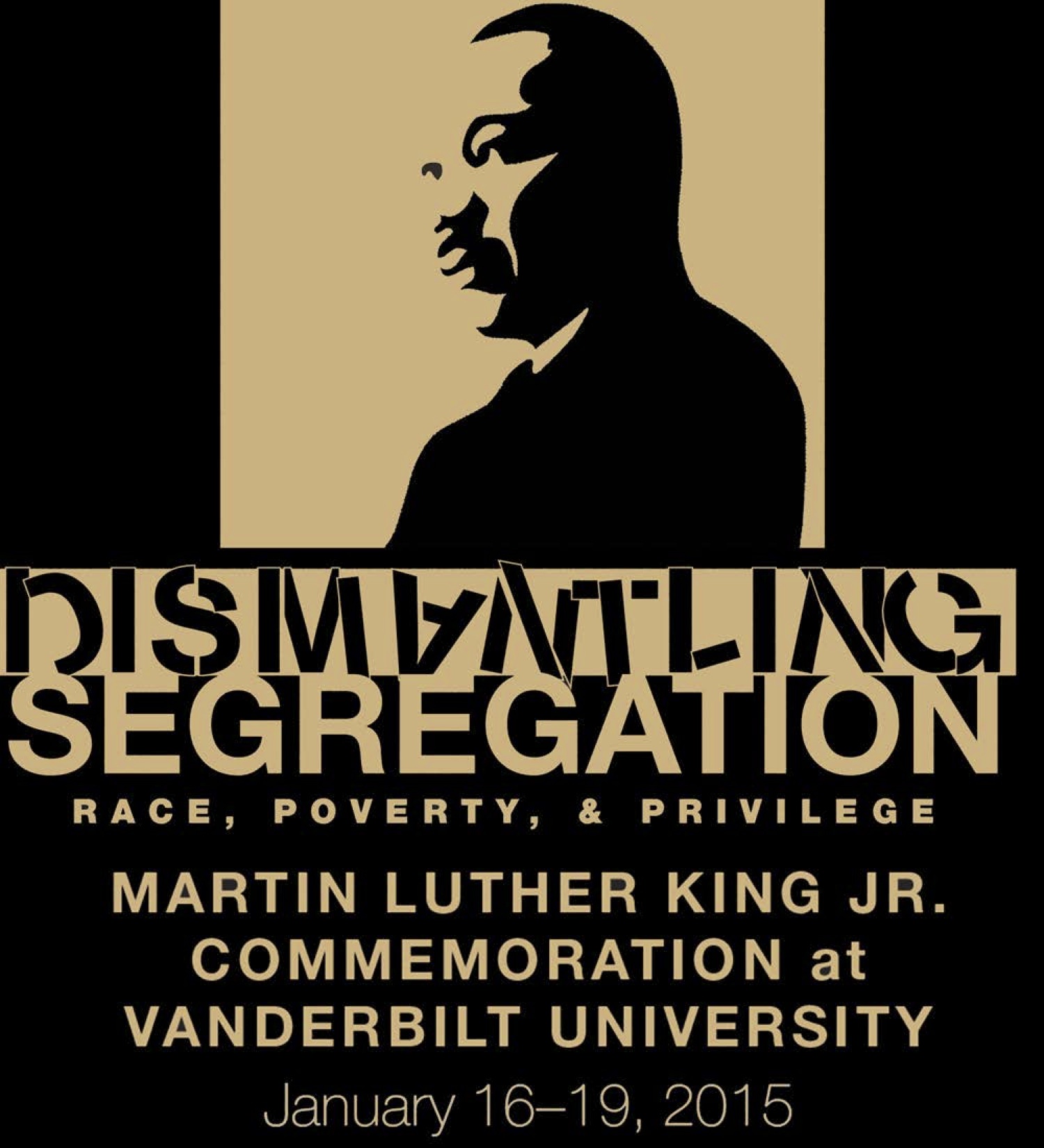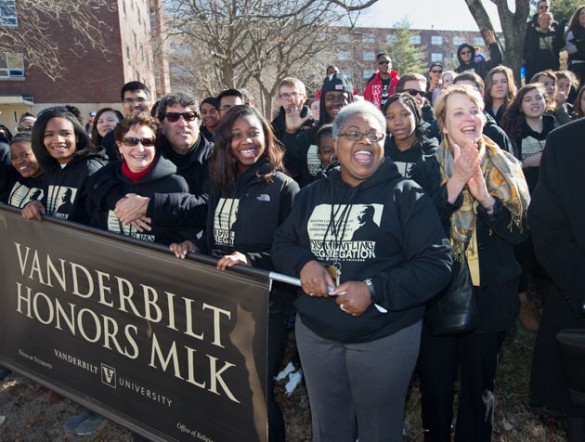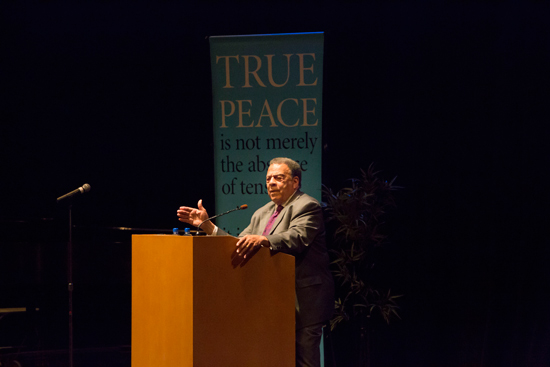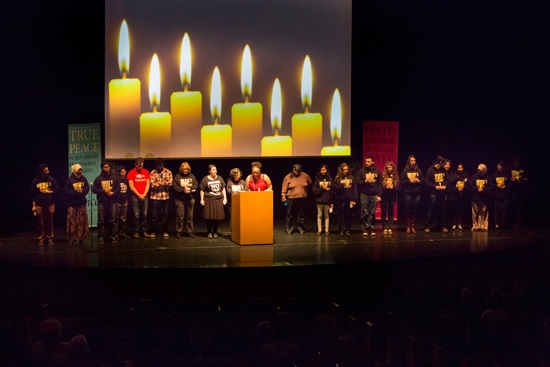2015 MLK Day Commemoration Recap
The 2015 MLK Day Commemoration at Vanderbilt saw larger numbers of students come out than ever before. This year’s theme “Dismantling Segregation: Race, Poverty, & Privilege” featured amazing events throughout the day and welcomed Civil Rights icon Ambassador Andrew Young as the evening’s keynote speaker.
(See some additional articles from the Vanderbilt Hustler about the day’s events)
The day began with the Vanderbilt’s participation in the Nashville Freedom March which began at 10 am leaving from Jefferson Street Baptist Church ending at Tennessee State University. Chancellor Zeppos was joined by over 300 Vanderbilt students to join the Nashville Community in the annual march.
Returning to campus, students had the opportunity to either participate in the Freedom Ride, or take part in the Lunchtime Symposium. Selected by lottery due to the overwhelming requests for a spot, the Freedom Ride took students across Nashville on a tour led by Kwame Lillard showing locations in our city that were key in the Civil Rights Movement. Stopping for lunch at Harper’s Soul Food Restaurant, the tour was an amazing experience held by all.
Those who stayed on campus had the opportunity to attend the Lunchtime Symposium with Dr. Sheryll Cashin. Professor Cashin explored how millennials in the #BlackLivesMatter and other 21st century social justice movements are transcending racial divisions, transforming activism, and beginning to realize MLK’s vision of a Beloved Community.
The afternoon saw the best attended Teach-in events in recent history. In some of the largest spaces across campus, packed audiences were part of six teach-ins dealing with all the themes of the day. “Race, Class, and Immigration Status: Conflicts and Realities” in Sarratt Cinema was led by Prof. Stella M. Flores, Associate Professor of Public Policy and Higher Education.
Dr. Stella Flores, whose scholarly work has addressed issues of access and equity in US education, led a discussion which touched on issues relating to demographic changes, immigration, and college admissions as they relate to underrepresented populations.
“The Future of Poor Children” in Furman Hall was led by Rev. Henry Blaze of VU School of Divinity. About 15 years ago mothers of poor children were told they had to go to work (Welfare Reform). It was said “Children growing up in homes and communities where there is work will be far better off over the long run than children growing up in homes and communities where there is only welfare.” After 30 years of growing inequality, ever expanding structural contradictions of capitalism, and predatory professional charity, what does the state of affairs suggest for the pending near future of poor children in America?
“Check Your Privilege” in the Ingram Commons MPR was led by Dr. Sheila Peters of
Fisk University. This session focused on the microinsults and microaggressions that we commit in our daily interactions within our human experience. Privilege in our human interactions empowers to rise above the insults and dehumanizing behaviors. Participants addressed how privilege belittles others and restricts open dialogue. In addition, participants addressed how to use privilege to provide leadership in the fight for social justice.
“Signs of the Movement: From Memphis to Ferguson” was held in the Black Cultural Center
and was a Photo Exhibit by Alexis Jackson. Photographer Alexis Jackson presented a cross generational exhibit exploring the themes of place, time, and protest within her body of work allowing the viewer to connect the protests surrounding the deaths of unarmed black men to the protests during the Civil Rights Movement. She intends for this body of photographs to serve as a visual reminder of the history of injustice in this country while encouraging viewers to think critically about how far we have come and how much further we have to go.
“Remembering Those Rendered Invisible” in the Ingram Commons MPR featured Dr. Frank E. Dobson, Jr. who is the Director of the Bishop Joseph Johnson Black Cultural Center here at Vanderbilt University. Dr. Frank Dobson and VU graduate students discussed racial hostility and its victims, by focusing on little-known historical occurrences as well as contemporary headlines. This teach-in was interactive, with a video presentation as well as large and small group discussions. A further focus of the discussion was on reconciliation and healing, how we each can become instruments of reconciliation across racial and class lines.
“How to Talk About Race” in Sarratt Cinema featured a panel of students, and staff including:
Justin Hua, Katherine Nash, Devin White, Katy Lucci, Matt Sinclair, and Catherine Deane. This teach-in sought to help people identify what makes them uncomfortable when talking about race in a multicultural setting, develop an awareness of the implication of their word choice, and equip them to engage in challenging, constructive conversations about race. The multi-cultural panel set the example of what intercultural conversations about race should look like. People walked away empowered to engage in these crucial conversations.
Later that afternoon, students gathered with the Office of Active Citizenship and Service to reflect on the prior Weekend of Service opportunities they had just completed. Students, faculty and staff who dedicated time to service over the weekend were invited to reflect with OACS staff on their experiences through the lens of our great social justice leaders.
The culmination of the day was in Langofrd Auditorium with our keynote presentation. Starting the evening with vocal performances by the Vanderbilt Chorale and students from the group Voices of Praise, the evening would next welcome four select readings from the winners of the MLK Day Commemoration Essay Contest. First and second place winners from both the Middle School category and the High School category riveted the audience with poetry and writings that spoke to the legacy and memory of Rev. King.
Next, Ambassador Andrew Young took the stage to share his thoughts, memories, and reflections on his time working hand in hand with MLK as well as his time in Congress, as the Mayor of Atlanta, and serving as a US Ambassador. With humorous memories and stories, as well as poignant points and ideas, Ambassador Young brought the close to capacity crowd to a place where they were ready to see Rev. King not only as a Civil Rights icon, but also as someone like us all who dared to live without fear. Concluding with an Interfaith Candlelight Vigil, the evening was brought to a thoughtful and solemn close as the messages and lessons of the day were collected and brought together.



